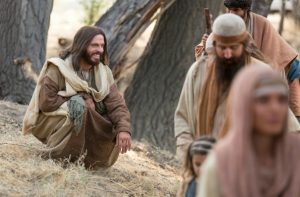If you have turned on the news or social media recently, you might have noticed what some describe as a time of tumult. Global events tower over the public’s consciousness. There are causes and factions and crises and movements. Politicians and pundits and activists are impassioned and opinionated about a number of issues that can grab your attention and — sometimes — your outrage. Nations are threatening nations, people are blaming people. Sometimes it seems like “the whole earth is in commotion” (D&C 45:26).
 As the events unfold, like a slow-motion, global train wreck, it can be hard to look away. And why would we look away? These are real events, right? These wars and riots and pandemics and debates and studies and policies — these have far-reaching consequences. We need to be good global citizens and stay informed, right? We need to stay attentive — involved, even. Perhaps we should even try to lead.
As the events unfold, like a slow-motion, global train wreck, it can be hard to look away. And why would we look away? These are real events, right? These wars and riots and pandemics and debates and studies and policies — these have far-reaching consequences. We need to be good global citizens and stay informed, right? We need to stay attentive — involved, even. Perhaps we should even try to lead.
When the world seems like a whirlwind, or the earth seems like an earthquake, where can we look for help? Where can we find peace? Where is God? Amazingly, the scriptures have an example of just this situation.
In the Book of Kings, the prophet Elijah looked for God in the whirlwind:
“Behold, the Lord passed by, and a great and strong wind rent the mountains, and brake in pieces the rocks before the Lord; but the Lord was not in the wind: and after the wind an earthquake; but the Lord was not in the earthquake: And after the earthquake a fire; but the Lord was not in the fire: and after the fire a still small voice. And it was so, when Elijah heard it, that he wrapped his face in his mantle, and went out, and stood in the entering in of the cave” (1 Kings 19:11-13).
The prophet Elijah found the voice of the Lord only after the fire was gone and the earthquake was over. Only when he was still and things were quiet could he hear the Holy Spirit.
The cacophony of the world offers a myriad of reasons to be afraid, to be distracted and to be angry. It all seems so urgent. It all seems so unparalleled. But it isn’t unparalleled. Gordon B. Hinckley spoke about a very similar situation in the April General Conference of 1964. In 1964, the President of the United States had just been assassinated. Congress was a tumult of opinions about the Civil Rights Act. The Soviet Union had nuclear weapons and was winning the Space Race. Things were in commotion. Big time. Here’s what Elder Hinckley had to say:
“The word of God … has come to us, not with trumpets, not from the council halls of the learned but in the still small voice of revelation. Listening to those who seek in vain to find wisdom and who declaim loudly their nostrums for the ills of the world, one is prone to reply with the Psalmist, ‘Be still, and know that I am God’ (Ps. 46:10).”
If Twitter existed in 1964, it would have been a hurricane of excitation, accusation, blame, shame and name-calling. But they didn’t have social media or a 24-hour news cycle in 1964. Have these new media helped us get closer to God? Or do they distract us?
President Russell M. Nelson said:
“We live in a world that is complex and increasingly contentious. The constant availability of social media and a 24-hour news cycle bombard us with relentless messages. If we are to have any hope of sifting through the myriad of voices and the philosophies of men that attack truth, we must learn to receive revelation.”
The headlines and commentary online is like a great and spacious building, hovering over the ground with real no foundation. Onlookers can be mesmerized by its glitter and flash. Billions of people crane their necks to gaze unceasingly at the cloud of swirling controversy, like Eve gazing harmlessly at the fruit. The cold, rough iron rod is so drab, so banal, so ordinary. Not like the Great and Spacious Drama — with a million salacious plot lines and dark emotions. Without even knowing it, without meaning to, they’ve let go of the rod, totally caught up in the thrall.
The beauty of the iron rod is its banality. The word of God is so ordinary, so obvious, so personal, and so simple. You don’t need a PhD to interpret it and you don’t need a project manager to carry it out. Anyone anywhere can follow the commandments, without any great organizing. The word of God is very personal.
The “relentless messages” of the whirlwind are anything but personal. They are the devil’s perfect perversion of God’s word. Instead of being close, they are distant. Instead of being specific, they are general. Instead of being spiritual, they are worldly. Instead of being personal, they are impersonal. The great and spacious building is so big and important, it doesn’t even touch the earth. The rolling controversies we subscribe to are so big and important, they can’t ever touch our heart.
We can take wisdom from the rabbi who was asked: “Why doesn’t God reveal Himself and speak to us like He did in ancient times?” The rabbi replied: “Because no one is left who will bow low enough.”
Joseph Smith Jr. taught:
“The Lord cannot always be known by the thunder of His voice, by the display of His glory or by the manifestation of His power, and those that are the most anxious to see these things, are the least prepared to meet them . . . We would say to the brethren, seek to know God in your closets.”
God is low. The gospel is found in simple, personal, modest and ordinary ways. The Holy Ghost speaks to us about the little things — in our closets, in our gardens, in small acts of kindness to our siblings and spouses.
Do we drift off to sleep with an echo chamber of the day’s worries in our heads? Do we lie on the pillow and replay commentary or outrages we witnessed online that day? Praying before we sleep is supposed to focus us. Reverting right back to the latest indignation du jour defeats the whole purpose of praying before we lie down to sleep.
When His followers came to Him with what seemed like real problems, Christ pointed them to the lillies: “Consider the lillies of the field, how they grow; they toil not, neither do they spin.” God’s glorious creation blooms eternal. Outside. Away from our screens. The trees grow green and the rains keep nourishing the earth, oblivious to the self-important “relentless messages” of doom and gloom, anger and outrage, blaring around them.
If we search for God in the whirlwinds of the world, we’ll never find Him. If we search in the causes and movements that shake the earth, we won’t find Him. If we seek him in the flames of outrage and indignation, no matter how justified our outrage feels, we will never find God. God moves the world through individuals and with whispers, not with loudspeakers. The world today needs less grandstanding and more gardening, less cynicism and more cycling, fewer presentations and more prayer.
“Much of what appears in your various social media feeds is distorted, if not fake,” President Nelson warned. He encouraged the youth and women of the Church to fast from social media. Stop looking up in the sky for God. Instead, bow low.
 The ultimate example of “lowliness” is the King of Kings, Jesus Christ. If we want to “lead” during these times of tumult, we should lead like Christ led. He comforted beggars and children. He led no marches. He founded no non-profits and wrote no speeches. He paused to speak with lepers, cripples, fig trees and to draw in the dirt. He was a “low” man. His message was dangerously personal, uncomfortably direct and pitifully simple: “blessed are the peacemakers,” “blessed are the meek,” “be still,” and “be of good cheer.”
The ultimate example of “lowliness” is the King of Kings, Jesus Christ. If we want to “lead” during these times of tumult, we should lead like Christ led. He comforted beggars and children. He led no marches. He founded no non-profits and wrote no speeches. He paused to speak with lepers, cripples, fig trees and to draw in the dirt. He was a “low” man. His message was dangerously personal, uncomfortably direct and pitifully simple: “blessed are the peacemakers,” “blessed are the meek,” “be still,” and “be of good cheer.”
The Holy Spirit is strongest when we work on things near to us, like a leaky faucet, a weedy patch on the lawn, a family member who needs a phone call, a neighbor who needs some cookies, or a rose that needs smelling. If we unplug, hold to the rod, bow low enough, and be still, we will find God no matter what whirlwind swirls around us.
Jonah Barnes is the author of Turning Little Hearts – Over 90 Activities to Connect Children with Their Ancestors. In addition to running a wholesale bakery, he enjoys doing family history, gardening, music, and caring for his six children and a flock of chickens. To learn more about Jonah and his work, check out his website, www.turninglittlehearts.com!







Thank you Jonah, for this reminder! We need more more voices whispering of Jesus Christ. He will lead the way through this darkness.
Jonah, this article is spot on! Thank you for writing this. It touched me deeply. All I can say is, Amen!
Just what I was searching for, information and more so, evidence of Christ’s lowliness….Multiplied Blessings to you and family!